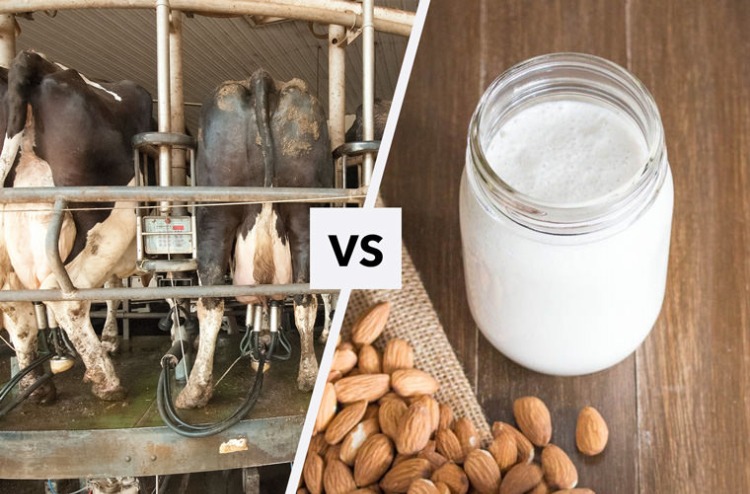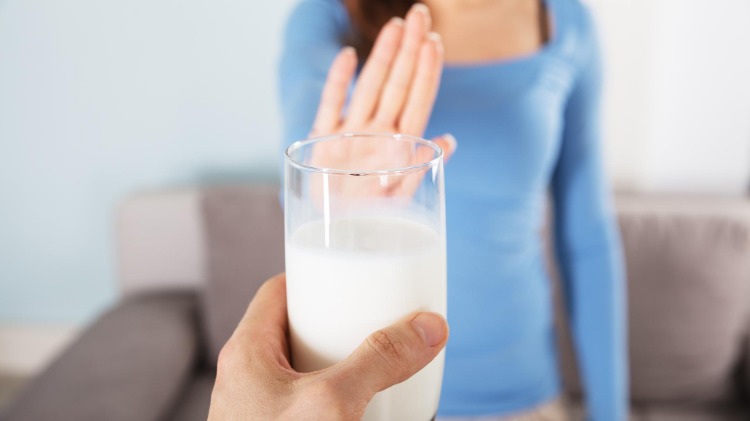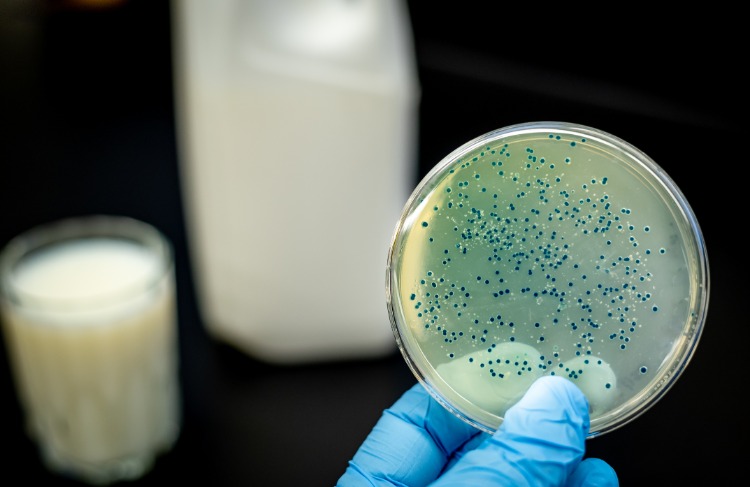Dairy products unhealthy? Good reasons for a milk-free diet
Whether dairy products are unhealthy is very controversial these days. While health organizations value dairy products as essential for your bones, some experts argue that they may be harmful to your health. Of course, not all milk products are the same. Most of them differ greatly in quality and health effects, depending on how animal owners breed the milk-producing cows and how they process the dairy afterwards. So in this post, we're trying to give you a detailed look and determine whether dairy products are unhealthy or good for your health.
Controversy over whether dairy products are unhealthy

Thanks to the massive advertising campaigns of the dairy industry, cow's milk has long been touted as a focal point for calcium. However, if you look beyond this framework, you can quickly see that milk could actually harm the body. For example, if you consume some types of cheese, yogurt, or ice cream, it could also pose many health problems. Many nutritionists do not recommend this and recommend excluding milk products from the diet. This could lead to a big difference in general health. Nowadays, the dairy's reputation for nutrition is as clear as a glass of milk. Dairy products are either good or bad for you, depending on the latest nutritional trend or a recent study.

Then where is the truth? Are dairy products unhealthy or not? Such foods are not essential in the diet for optimal health, but for many people, they are the easiest way to get calcium, vitamin D and protein. People need these to keep their heart, muscles and bones healthy and to function properly. Dairy products therefore undoubtedly contain nutrients such as phosphorus, magnesium, vitamin D and protein, whereby the calcium also contained in them is a necessary mineral. It helps build strong bones and is required for other functions such as muscle contraction and nerve transmission. These are some of the main reasons why most health professionals recommend consuming dairy products.
Improve bone health with calcium

For example, a systematic review and meta-analysis suggests that in some studies, the risk of osteoporosis and hip fractures decreases with increasing intake of dairy products. However, this was not the case in all studies included in the analysis. It is also important to explain that many other factors can affect bone health. Examples include physical activity, smoking, alcohol consumption and some changes in hormone levels during aging.

However, calcium sources help maintain bone density and can reduce the risk of fractures. Adults up to 50 years of age need 1000 milligrams (mg) of calcium per day. Women over 50 and men over 70 need 1200 mg. A typical serving of yogurt contains about 187 mg of calcium. Milk is also fortified with vitamin D, which bones need to maintain bone mass.

Older adults also need protein to protect against sarcopenia, the natural age-related loss of muscle mass and strength, and dairy products can be a decent source. The recommended amount for older adults is 0.8 grams per kilogram of body weight. An 80-pound man would need about 65 grams of protein a day, and a 60-pound woman – about 50 grams. However, when it comes to the direct health effects of dairy products, the existing science is mixed. Some studies warn against consuming too much milk, while other studies show some benefits of regular milk consumption.
Are fat-free and full-fat dairy products unhealthy?

Nutritional science continues to recommend that adults adhere to fat-free or low-fat dairy products. However, new research suggests that full-fat dairy products may not pose a major threat to heart health. A report presented at the 2018 European Society of Cardiology congress examined 20 studies involving almost 25,000 people and found no association between the consumption of most dairy products and cardiovascular diseases.

The exception was milk, but the results showed that only very high milk consumption (almost one liter per day on average) was associated with a higher risk of heart disease. So it turns out that dairy products are the biggest source of saturated fat in our diet. At least a third of the saturated fatty acids consumed by the world comes from cheese, butter, milk and other dairy products. Given that saturated fat is a major cause of heart disease and obesity, this seems a good reason to avoid such foods.
Good reasons to switch to a dairy-free diet

There are several important health reasons for a dairy-free diet. Two of these are inflammation control and hormone balancing. Milk is made by mammals to feed their young and is a rich source of protein and growth hormones to develop a baby from an early age. However, humans are the only mammals that consume milk from other animals and also the only ones who drink dairy in adulthood. While dairy products can be a great source of protein, there can be other issues associated with consumption. So if people do without dairy products, there are opportunities to reduce inflammation, balance hormone levels and treat other troublesome symptoms. So there are several reasons why dairy products are unhealthy and can cause problems.
Conventional milk products for diabetes

Although people need some of the vitamins and minerals contained in milk, they do not have to be exposed to the additional antibiotics and hormones that are used in traditional milk products. The sad truth is that most dairy cows are given antibiotics in large quantities to prevent infection. These antibiotics end up in traditional dairy products, which means people are also exposed. The use of antibiotics in the dairy industry can be one of the causes of antibiotic resistance. In addition to the antibiotics that are given to cows that get into the milk, people are also exposed to growth hormones when consuming conventional dairy products. Most dairy farms give dairy cows a synthetic version of bovine growth hormone (BGH) to stimulate milk production and further increase insulin-like growth factor (IGF) in milk supply. Scientists associate higher IGF-1 levels in humans with an increased risk of cancer.

Insulin-like growth factor is included in milk to fatten babies. For this reason, eating dairy products increases insulin levels accordingly. Drinking milk is therefore not recommended for people who need to avoid excessive insulin production. These would be, for example, people with diabetes, polycystic ovary syndrome (PZOS) and other serious metabolic disorders. Dairy products of all kinds, as well as yogurt, cheese and everything related to casein and whey, can cause a significant insulin response. One study showed that dairy products raised insulin levels much more than white bread in some people. Obviously that's not a good thing if you're trying to stay away from high blood sugar or to reduce your weight.
Digestive problems and estrogen in milk

When trying to balance your hormones, you should consider avoiding cow's milk. Milk consumption promotes excess estrogen in the body because it contains it from female cows. Eating dairy products can make up to 80% of the estrogens in the diet if you consume a lot of them. This is not healthy because excess estrogen from any source has been linked to an increased risk of cancer in women. Men are also at higher risk of developing prostate cancer if they have excess estrogen in the body. This hormonal imbalance can also cause mood swings and lead to unwanted reactions like acne.

An estimated 70% of the world's population may be lactose intolerant. Even people who produce lactase, the enzyme needed to break down lactose in dairy products, can experience indigestion when consuming dairy products. Flatulence, irritable bowel syndrome (RDS), nausea and chronic constipation or diarrhea are common complaints of people who consume cow's milk, whether allergic, intolerant or not. Dairy products are even on the list of the eight most common allergenic foods. For this reason, negative health symptoms can occur after eating foods that contain lactose.

In addition to indigestion, dairy products are known to cause excessive mucus production in the airways. This means that they could also be an asthma trigger. Avoiding dairy products can benefit people who have asthma or who are prone to upper respiratory infections. People have also reported many dairy products as triggers for arthritis symptoms, rashes, acne, migraines, narcolepsy, and unexplained inflammation. As a result of all the possible reactions listed above, eating dairy products can lead to an increase in inflammation in the body. Chronic inflammation is definitely not healthy and can lead to disturbing symptoms.
Alternatives to milk

So how do you get the nutrients you need if you don't consume dairy products? Eating milk is not the only way to include its beneficial vitamins and minerals in your diet. In addition to traditional dairy products full of hormones, antibiotics and pesticides, there are better sources of calcium. Some excellent ones are kale (24%), sardines (21%), broccoli (9%), almonds (8%) and mustard cabbage (7%). However, you can also get calcium from fortified milk alternatives. If you prefer to make your own dairy-free products at home, many recipes for cashew milk, homemade unsweetened almond milk, macadamia nut milk, oat milk, and even hemp milk could help.
Are fermented milk products unhealthy?

Some scientific evidence has even shown that the right type of dairy can prevent heart disease. A study of 2,000 men published by the British Journal of Nutrition found that those who ate a lot of fermented milk products such as yogurt and cheese were less at risk of coronary artery disease than men who ate less of these products. This supports previous studies that showed that fermented milk products have healthier effects on blood lipids and the risk of heart disease than other dairy products. However, no other proposed advantage has arisen. Saturated fats are found in full-fat milk products such as whole milk, butter and cream and to a lesser extent in low-fat milk products such as 1% milk. Saturated fats are also found in meat, some processed foods, coconut oil and palm oil.

If you know that you can tolerate dairy products and you don't want to avoid them completely, make sure you consume them from certified organic sources with grass feed. Raw and fermented milk from trusted manufacturers is a great option. Also, make sure you choose the full fat versions for additional health benefits. Milk, cheese, yogurt, butter, clarified butter and kefir from other animals such as goats, buffalo, sheep and camel are other healthier alternatives.

However, be careful with protein powders, even if they come from certified sources. If you are not sure whether you should eat a completely milk-free diet, you can try an elimination diet. If you cut out the dairy from the menu for at least 3 weeks (some doctors recommend up to 6 weeks), you can get a very good idea of how you feel about it.
The post dairy unhealthy? Good reasons for a dairy-free diet appeared first on Deavita.com | Living ideas, design, hairstyles, make-up, lifestyle, health and beauty tips.





















